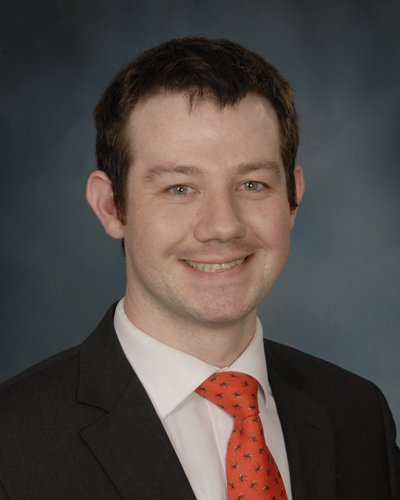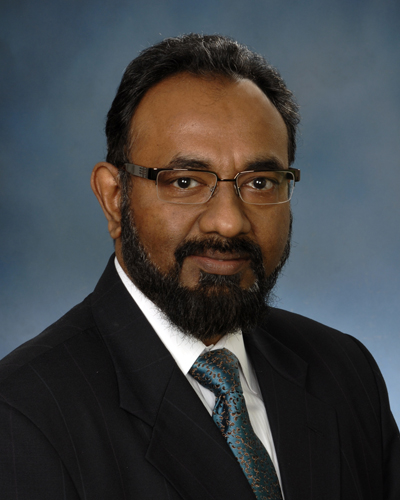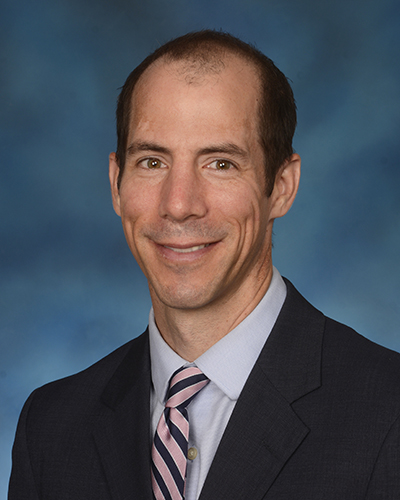
January 21, 2022
Dr. Brajesh Lal and Dr. Brian Englum discussed the aims of their pilot project, which was awarded $25,000 in the 2022 Seed Grant Award from the Program in Population Health and Health Equity. Read more about their award below.
Dr. Tim O'Connor presented "How to Partner with a Geneticist for Equity Research."
Transdisciplinary Research Team Awarded 2022 Seed Grant by Program in Health Equity and Population Health
The team, led by Lal and Englum, will investigate COVID-19 related disruptions in the diagnosis of new cancers
The Program in Health Equity and Population Health (HEPH) at the University of Maryland School of Medicine (UMSOM) announced their selection for their 2022 Seed Grant Award. Through funds provided by the SOM Dean’s Office, the Program has selected one proposal for the 2022 round of seed funding and will be soliciting proposals for the 2023 funding in the coming year. A total of $100,000 will be distributed across four projects over two years.
The Program, housed within the Department of Epidemiology and Public Health, is a research-focused entity that aims to support the elimination of health disparities in Baltimore City, Maryland, and beyond through research, education, and community engagement. The Program provides opportunities for networking and education for faculty and support for external grant submissions. The Center functions as a hub for collaborations between School of Medicine (SOM) partners to achieve shared goals that support equity, diversity, and inclusion within the SOM and its surrounding community. In April 2021, the Program established 5 topic-specific think tanks for research, and applications for seed funding came from think tank members and focused on a collaboration with a community partner. Think tanks are currently operating in the following areas:
- Maternal and Child Health Disparities
- Disparities in Infectious Diseases
- Obesity, CVD, and Diabetes Disparities
- Disparities in Mental Health and Addiction
- Cancer Disparities
 Brajesh K. Lal, MD, Professor in the Department of Surgery and Brian R. Englum, MD MHS, Assistant Professor in the Department of Surgery are the PIs on the project, titled “COVID-19 related disruptions of new cancers: disparities in care utilization and patient outcomes”. The project aims to identify patient and community factors that impact the disruption in new cancer diagnoses in the COVID era, quantify the consequences of the disruption, and how patient and community factors impact these consequences.
Brajesh K. Lal, MD, Professor in the Department of Surgery and Brian R. Englum, MD MHS, Assistant Professor in the Department of Surgery are the PIs on the project, titled “COVID-19 related disruptions of new cancers: disparities in care utilization and patient outcomes”. The project aims to identify patient and community factors that impact the disruption in new cancer diagnoses in the COVID era, quantify the consequences of the disruption, and how patient and community factors impact these consequences.
"According to their proposal, “The proof of concept from this project will provide preliminary data and develop the collaboration between Drs. Englum, Lal, and the community resources to prepare competitive applications for additional grants through the VA merit mechanism and R01 grants through the National Cancer Institute (NCI) or the National Institute for Minority Health and Health Disparities (NIMHD)”.
Erin Hager, PhD, Associate Professor of Pediatrics, is the Director for the Program in Health Equity and Population Health and the Center for Equity, Diversity, and Inclusion. “We are really excited to see our first seed grant awarded to support such important work. Three additional grants will be awarded to Program members over the next year or so. We hope that this generous support from Dean Reece will spur greater involvement of faculty in the Program”.
Dr. Lal, a vascular surgeon at the University of Maryland Medical Center, said “The COVID pandemic has resulted in several unanticipated consequences unrelated to the virus itself. Foremost among these is an adverse impact on cancer detection programs. We anticipate that the stresses on healthcare resources may exaggerate pre-existing inequities in healthcare services. Our study seeks to detect and quantify this potential adverse impact of the pandemic on cancer detection within minority populations, and in so doing, highlight the need for additional attention to reverse these trends”.
As Director of the Center for Vascular Diagnostics, Dr. Lal manages one of the largest clinical vascular laboratories in the country with over 15,000 tests performed every year. The center adjudicates imaging data from several NIA, NINDS, DOD and the VA funded studies, during which he has developed several novel diagnostic vascular tests for vascular disease. Dr. Lal will serve as co-PI and share the award with Dr. Brian Englum, who specializes in Pediatric General Surgery at the University of Maryland Medical Center, is also a member of the Cancer Disparities Think Tanks.
 Along with Dr. Lal, Dr. Englum will speak to the members of the Program in Health Equity and Population Health at their all-member meeting in January. According to Dr. Englum, “COVID has taken an enormous toll on all of us, both in terms of the direct impact on patients infected with COVID as well as the disruptions to the lives of those not infected. COVID has also demonstrated a staying power that has been frustrating for everyone. As we work to recover from the obvious impacts of COVID -family deaths, overwhelmed hospitals, school shutdowns, and supply chain delays, there is the potential for an additional layer of disruptions to go unnoticed. Cancer surveillance and diagnosis are one of those issues. We know that medical systems are performing fewer surveillance procedures. We are diagnosing fewer cancers.
Along with Dr. Lal, Dr. Englum will speak to the members of the Program in Health Equity and Population Health at their all-member meeting in January. According to Dr. Englum, “COVID has taken an enormous toll on all of us, both in terms of the direct impact on patients infected with COVID as well as the disruptions to the lives of those not infected. COVID has also demonstrated a staying power that has been frustrating for everyone. As we work to recover from the obvious impacts of COVID -family deaths, overwhelmed hospitals, school shutdowns, and supply chain delays, there is the potential for an additional layer of disruptions to go unnoticed. Cancer surveillance and diagnosis are one of those issues. We know that medical systems are performing fewer surveillance procedures. We are diagnosing fewer cancers.
This project will quantify those disruptions and focus on the exaggerated impacts that usually hit disadvantaged communities. We hope this project leads to a surveillance system that will help us map out what populations are seeing decreased access to cancer surveillance and diagnoses. We can then check if these same communities are seeing worse cancer outcomes -increased mortality or late-stage disease. What we do not want is to wake up in 5 years and realize that COVID is behind us, but the disruptions it caused have left us with a new epidemic of undiagnosed cancers that are hitting our most vulnerable populations when it’s too late to help them”. Dr. Englum’s other research is focused on complex congenital anomalies, pediatric surgical oncology, pediatric colorectal surgery, pediatric thoracic surgery, minimally invasive surgery, health services research, comparative effectiveness research, and big data analysis.
Laundette Jones, PhD, Assistant Professor of Epidemiology and Public Health and the Deputy Director for the Program in Health Equity and Population Health, is one of the leaders for the Cancer Disparities Think Tank. Dr. Jones also serves as the Associate Director of Community and Social Impact for the Center for Epigenetic Research in Child Health and Brain Development (CERCH) at UMSOM. In this role, she provides expertise in building trusting community-academic partnerships, including helping to coordinate, develop, and maintain research infrastructure to enable community participation and developing research protocols that work effectively in community settings. "We are thrilled to support the Transdisciplinary research team led by Drs. Englum and Lal at the University of Maryland School of Medicine, Department of Surgery and their community partner Ms. McCormick,” said Dr. Jones. “This community-academic partnership is groundbreaking and is another step towards advancing health equity by addressing critical health issues influenced by the social determinants of health."
Along with supporting the efforts of the research being conducted on this project, the Cancer Disparities Think Tank goals include developing research questions and securing funding to design new projects to investigate disparities in cancer diagnoses and treatment outcomes. All applications for the Seed Funding Awards went through a review and scoring process, led by members of the Program in Health Equity and Population Health.
Dr. Lal and Dr. Englum’s project is bolstered by their relationship with their community partner and advisor, Nancy McCormick. Nancy McCormick is a retired legal secretary and member of the Baltimore community for over 40, over which time she has developed a deep commitment to cancer research and cancer community projects, borne of her personal history with cancer. Her observation of changes in the community and institutional barriers to healthcare because of the COVID-19 pandemic helped form the basis for the research questions in this project. Ms. McCormick currently serves on the community advisory board of the PATIENTS program for Patient-Centered Outcomes Research (PCOR). Her excellent experience in this role has lent itself to participating in the development and prioritization of research questions, and she will continue to participate throughout the project by providing a community perspective. Ms. McCormick shed some light on the enormous importance of this work, “We feel that surgeries and treatment are just as important during these times. How many lives were lost because they could not be treated because of COVID?”.
If you are interested in learning more about this project, additional upcoming opportunities to apply for funding, or joining one of the Think Tanks, please visit our website to join our email distribution list and receive meeting invitations, or contact Erin Walton at erin.walton@som.umaryland.edu.
